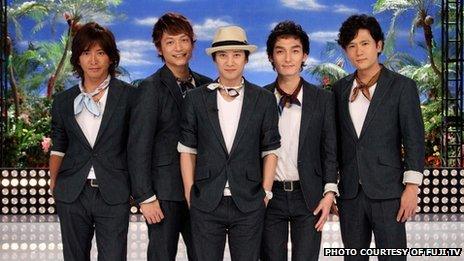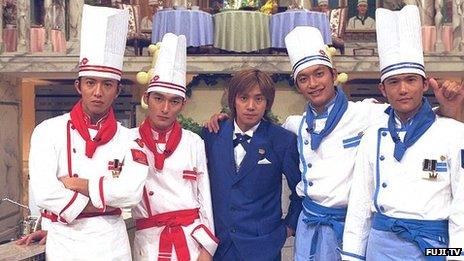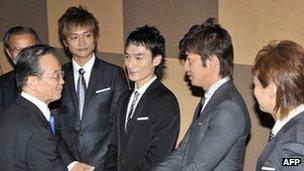Japanese boy band SMAP's 20 years at the top
- Published

SMAP are in their late 30s, except for Mr Nakai (C) who is turning 40
On Saturday the leader of one of Japan's most popular boy bands passes a key milestone - SMAP's Masahiro Nakai is turning 40.
To be fair Mr Nakai, who has been on Japan's screens and airwaves for two decades, doesn't look his age.
But he has certainly moved from the ranks of pop idol into all-round entertainment stalwart and icon.
His acting career includes appearances in more than two dozen soap operas and six movies.
He was also the main newscaster for the Olympic Games for Tokyo Broadcasting System Television (TBS), not only in London, but for the last four summer and winter games.
And he's hosted Japan's prestigious New Year's singing competition a total of six times.
But it is as one-fifth of boy band SMAP that he is known above all. The group - whose four other members are also in their late 30s - are frequently seen in colourful costumes, singing pop songs on music programmes.
SMAP is one of many groups produced by Johnny Kitagawa, who was recently presented with two Guinness World Records for "Most no.1 singles produced by an individual" and for "Most concerts produced by an individual".
But the group stands out for maintaining top-level popularity for more than 20 years. So what's their secret?
Not 'Prince Charming'
When SMAP made their debut under Johnny & Associates in 1991, it was not exactly smooth sailing.
"SMAP's debut song didn't even make it to the top 10," said Associate Professor Noboru Saijo of Edogawa University.
"Previous groups were seen as Prince Charming types and became popular instantly but by the 1990s, music programmes were in decline and fans wanted more than just good-looking boys who could sing and dance."

It's not just singing - SMAP also cook
That is when the man behind multiple boy bands decided to try something else.
"Johnny went to local TV stations and asked them to use SMAP on their variety or comedy shows," said Prof Saijo, who is also an entertainment analyst.
It was a surprising move - but one that worked out.
"I first saw Nakai on a variety show in 1994," says 46-year-old Natsumi Ono, who has been a dedicated fan ever since.
"I love the range that he has - his serious acting and commentating side and his charming comedy side."
Boy band diplomacy
Other band members Takuya Kimura, Goro Inagaki, Tsuyoshi Kusanagi and Shingo Katori also went from strength to strength.
Mr Kimura was voted Japan's sexiest man for 15 years in a row by readers of one magazine. Mr Inagaki, meanwhile, has played villains in several TV dramas.
Mr Kusanagi is fluent in Korean and has appeared in South Korean programmes and movies. Through his work, he has been credited with bringing South Korea closer to the hearts of his Japanese fans.
The youngest member, Shingo Katori, has appeared in multiple television dramas. A character he plays, Shingo Mama, is used by the Ministry of Education to promote family communication.
The group have even taken part in diplomatic endeavours. In September 2011, they performed their first overseas concert in Beijing, after Chinese Premier Wen Jiabao said he hoped SMAP could "bring seeds of China-Japan friendship that take deep root and blossom in China".
This diversity is what has kept SMAP in the spotlight for so long, Prof Saijo said.

The group have even engaged in Sino-Japanese diplomacy, meeting Chinese Premier Wen Jiabao
"Other groups lost their popularity when they were no longer seen as the Prince Charming," he said. "But the different roles SMAP members have played have raised the idol age limit."
Nudity incident
But the group's journey has not been without scandals. Original member Katsuyuki Mori's departure to race motorcycles remains a sensitive topic.
Goro Inagaki, known as the shy one, was arrested for turning a simple parking violation into a hit-and-run incident in August 2001.
Even though the policewoman who was hit was only slightly hurt, Mr Inagaki and the group's reputation was seriously damaged.
Then in April 2009, Tsuyoshi Kusanagi was arrested for public indecency after being found drunk and naked at a Tokyo park. The story shocked his fans, who saw Mr Kusanagi as the quiet and polite one in the group.
But the band got back on track.
"I was very moved by Nakai's firm leadership after these scandals," said long-time fan Ms Ono. "It really showed that he cared for the members and it showed his maturity."
Even Mr Nakai's fans will admit that he has one weakness, however - his singing skills.
"I've grown to love the fact that he cannot sing well and isn't perfect," said Ms Ono. "Even my own mother is a bit fed up with my obsession, but I like watching him because he is so genuine."
Since SMAP, there have been many younger groups which have gained popularity. But Prof Saijo says that it was SMAP who forged their career paths.
Rumours have gone round several times that the group could split up.
But Japan has watched a group of five teenage boys entertain them over two decades and, as one fan put it, they want to grow old with SMAP.
- Published16 September 2011